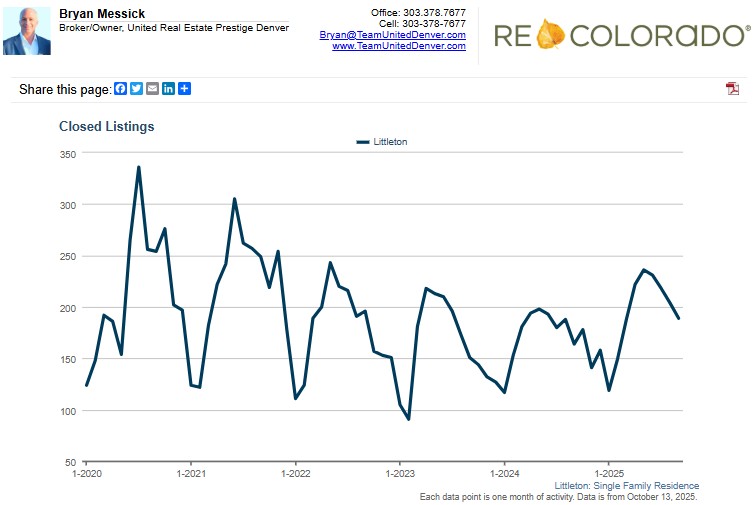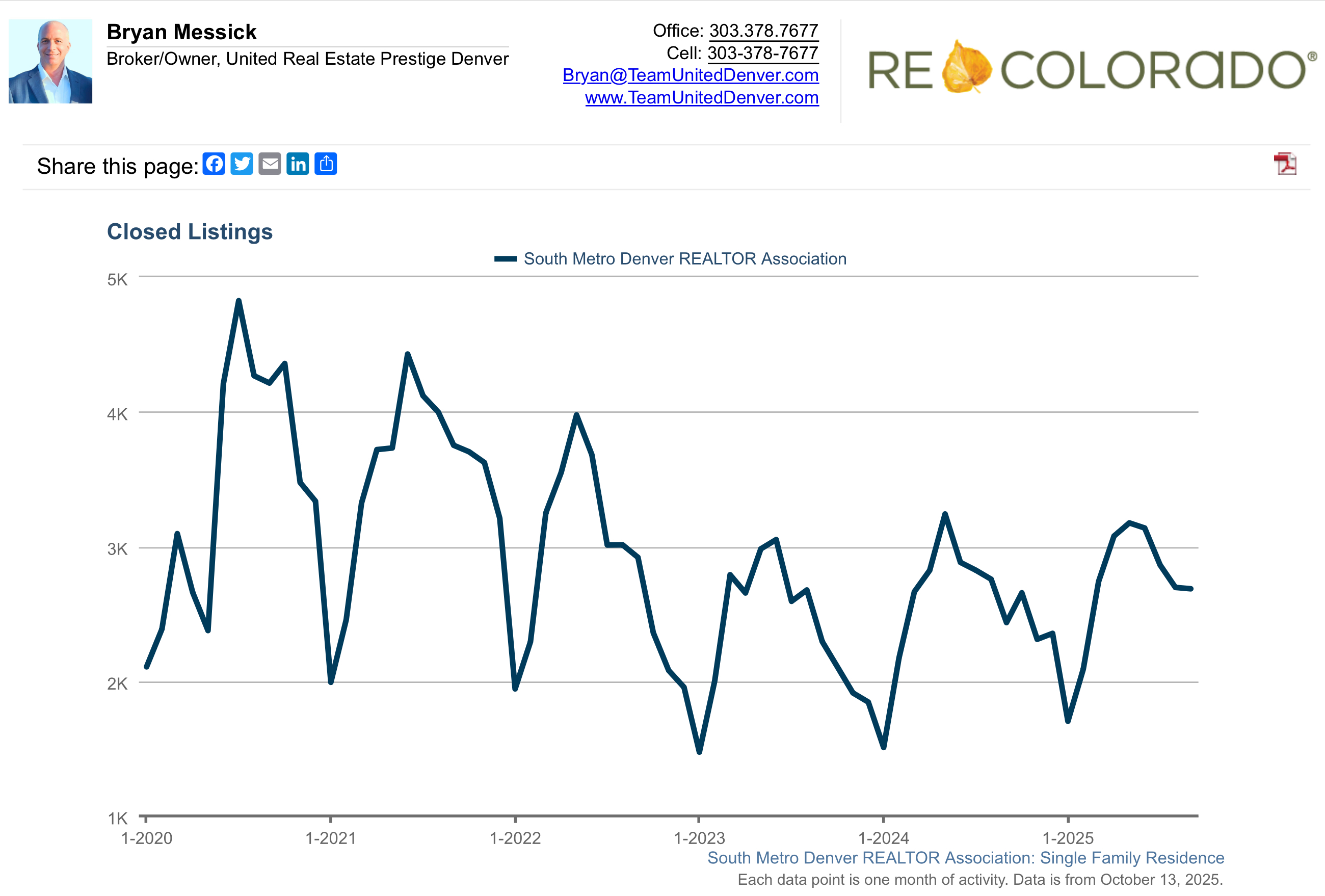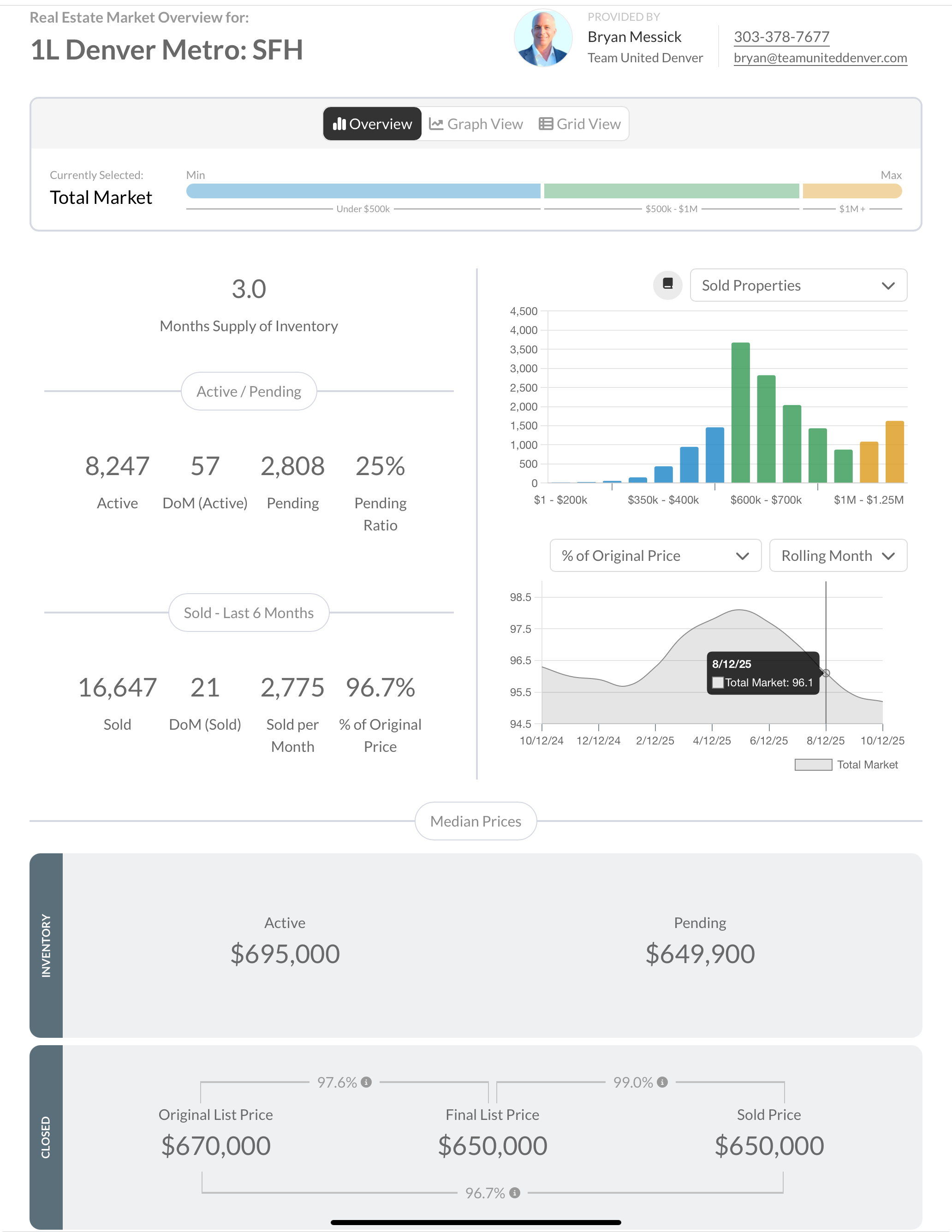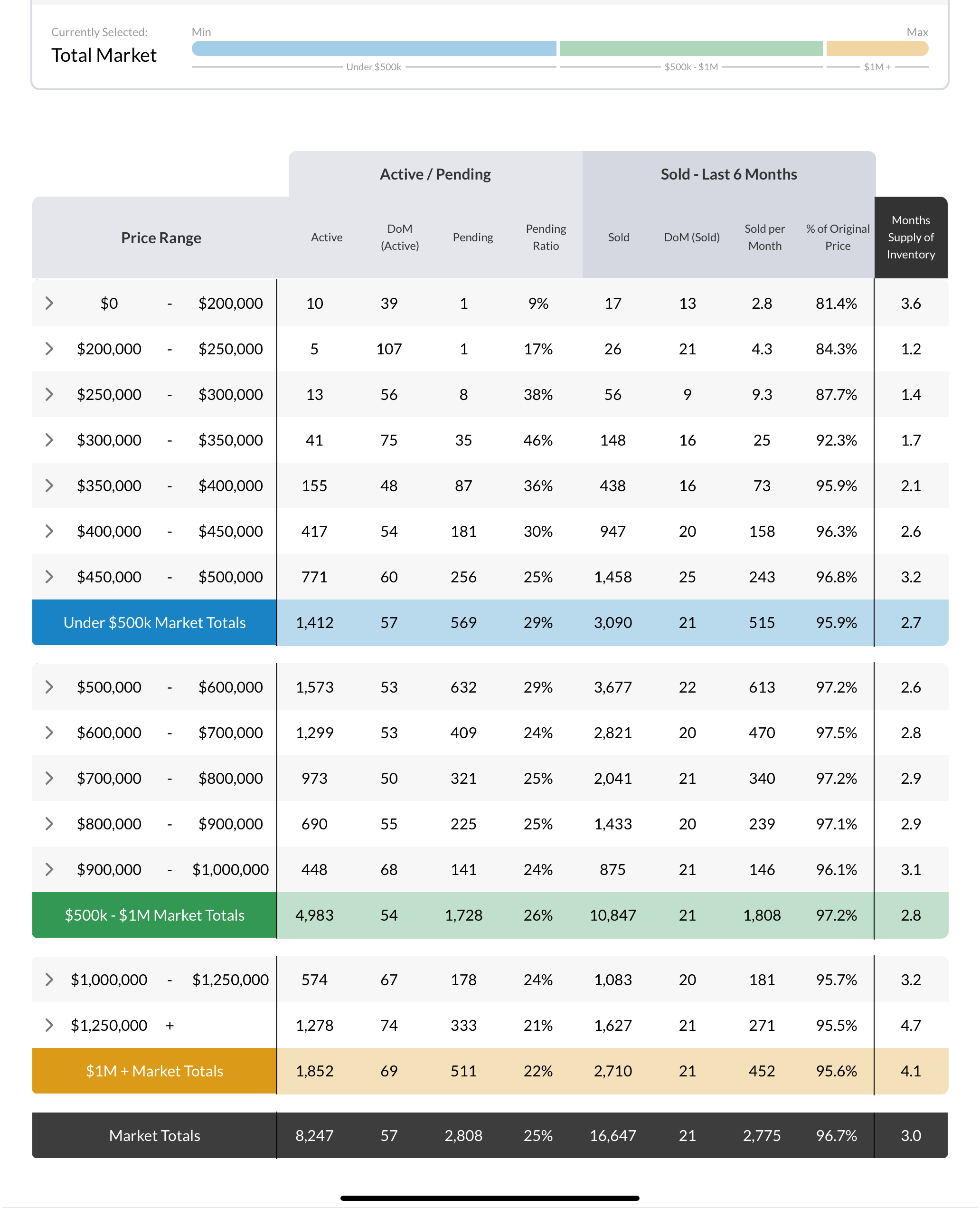Categories
Denver Housing MarketPublished October 13, 2025
Denver Metro Housing Market Insights: Should I sell my Denver home in the Fall or wait to sell until Spring?

As a Denver Metro homeowner, deciding when to list your home is one of the most important strategic decisions you'll make in your selling journey. While Springtime is often heralded as the "prime" selling season, Fall presents unique opportunities that many sellers overlook: especially in our current market conditions. If you're wrestling with whether to list now or wait until Spring 2026, here's what the latest data reveals about timing your sale in the Denver Metro single-family home market.
The conventional wisdom suggests waiting for Spring, but the reality is more nuanced. Both seasons offer distinct advantages, and the right choice depends on your specific circumstances, timeline, and market priorities.
Market Activity Remains Strong in the Fall
Despite what you might expect, buyer activity across the Denver Metro area hasn't hibernated for the season. Recent data from the last three months shows remarkably steady buyer engagement across most price ranges, defying the traditional seasonal slowdown narrative.
The pending-to-total ratio: which measures the share of homes currently under contract: is holding steady at 25%. This is a critical indicator that speaks volumes about ongoing demand. When a quarter of all active listings are already under contract, it signals that motivated buyers aren't just window shopping; they're actively making offers and moving forward with purchases, even as we settle into the cooler months.

This sustained activity reflects several factors unique to the Denver market. Our region continues to attract relocating professionals, military families, and out-of-state buyers who can't wait for Spring to make their moves. Corporate relocations often happen on fiscal year schedules that don't align with traditional real estate seasons, creating consistent demand throughout the fall months.
Additionally, the Denver Metro's diverse economy: from tech companies in Boulder to aerospace in Littleton: means buyer activity isn't solely dependent on family-driven Spring purchases. Professional buyers, investors, and downsizing empty nesters maintain active search patterns year-round.
Days on Market: Not Significantly Longer
One of the biggest concerns sellers have about listing in Fall is the fear their home will languish on the market. The data tells a different story. The median days on market for sold homes currently sits at 21 days: just slightly longer than peak Spring performance, but still representing a healthy, efficient market pace.
Breaking this down by price segment reveals even more encouraging news for sellers. Homes in the critical $500,000 to $1 million range: which represents the sweet spot for much of the Denver Metro market: are seeing a median days on market of just 31 days. This means that well-priced, well-presented properties are moving efficiently, regardless of season.
To put this in perspective, during the height of the Spring-selling season, median days on market typically hover around 20-25 days. The difference between 25 days and 30 days is negligible from a practical standpoint, especially when you consider the reduced competition you'll face in the Fall.
This performance indicates that serious buyers aren't waiting for Spring: they're actively searching and ready to move when they find the right property. Your home doesn't need to sit empty through Winter if it's properly positioned for the Fall market.

Click Here: Visit our interactive Metro Denver Housing Trends page
Pricing Remains Competitive
Perhaps the most compelling argument for Fall listing comes from pricing data. Sellers are still achieving impressive results, with the average sale-to-original list price ratio holding at 96.7% across the Denver Metro area. This means homes are selling very close to their initial asking price, a clear indication that serious buyers understand current market values and are willing to pay fair prices.
This pricing performance is remarkably consistent across most price segments and neighborhoods, suggesting that Fall buyers aren't necessarily looking for deep discounts just because inventory might be higher. Instead, they're focused on finding the right property and are prepared to pay market value when they find it.
The 96.7% sale-to-original list price ratio also indicates that sellers who price their homes correctly from the start are avoiding the multiple price reduction cycle that can plague overpriced listings. In Fall, accurate initial pricing becomes even more critical, as buyers have fewer options to compare against and can more easily identify overpriced properties.

This pricing stability reflects the underlying strength of the Denver Metro market. While we may not be seeing the rapid appreciation of previous years, home values remain robust, supported by continued population growth, limited inventory, and strong local employment.
Less Competition Can Work in Your Favor
Here's where Fall listings gain a significant strategic advantage: reduced competition. As traditional wisdom drives many sellers to wait for Spring, Fall inventory naturally decreases, creating opportunities for sellers willing to buck conventional timing.
With fewer homes competing for buyer attention, your property has the chance to shine brighter in the marketplace. Instead of being one of dozens of similar listings flooding the market in April and May, your home can capture focused attention from the buyers who are actively searching during fall months.
This reduced competition often translates into more meaningful showing activity. Fall buyers aren't spreading their weekend house-hunting across 15 different properties: they're more focused, more serious, and more likely to make decisions quickly when they find a home that meets their needs.
The inventory reduction also means less pressure on pricing. When buyers have fewer options, well-priced homes don't face the same aggressive price competition that characterizes peak Spring markets. This can result in more straightforward negotiations and fewer contingency-heavy offers.
Spring Isn't a Guarantee
While spring traditionally brings more buyers to the market, it also brings significantly more listings, creating a double-edged sword for sellers. The flood of new inventory that hits the market between March and May can create intense competition among sellers, potentially driving down prices and extending time on market for properties that don't immediately stand out.
Spring's buyer influx comes with challenges. Many of these buyers are just beginning their search process, meaning more tire-kickers, more lowball offers, and more deals that fall through during the due diligence period. Fall buyers, by contrast, have often been searching for months and are more prepared to move quickly when they find the right property.
Additionally, Spring markets can create bidding wars that benefit some sellers while leaving others behind. If your home has unique challenges: unusual layout, busy street location, or higher price point: the intense competition of Springtime might actually work against you as buyers focus on the most obviously appealing properties.
The mortgage market also affects Spring dynamics. While rates have stabilized somewhat, the Spring rush can create processing delays and increased competition for loan products that might not be factors in Fall transactions.
Click Here: Compare Mortgage Rates - Mortgage News Daily
Current Market Context
Understanding where we stand in the broader market cycle is crucial for timing decisions. The Denver Metro market has shown resilience through economic uncertainty, but we're also seeing some normalization from the extreme seller's market conditions of recent years.
Inventory levels, while still below long-term averages, have increased from historic lows. This creates more balanced conditions where both timing and strategy matter more than they did when any property would sell within days of listing.
Interest rates, while higher than pandemic-era lows, have stabilized at levels that still allow qualified buyers to make purchases. Fall buyers have had time to adjust to current rate environments and are making decisions based on realistic financing scenarios rather than hoping for rate improvements.
Making the Right Decision for Your Situation
The choice between Fall listing and waiting for Spring ultimately depends on your specific circumstances and priorities. Fall listing makes sense if you need to relocate for work, want to avoid the Springtime competition rush, or have a property that appeals to serious, motivated buyers who aren't swayed by seasonal factors.
Spring might be worth waiting for if you can afford the flexibility, want to maximize every dollar of your sale price, or have a family home that would benefit from the increased buyer activity that comes with school-year timing.
Consider also your next move. If you're buying another home in the Denver Metro area, selling in Fall while inventory is lower might help your purchase timeline, as you won't be competing with as many other buyer-sellers in your next purchase.
Bottom Line
Fall 2025 represents a genuine opportunity for Denver Metro sellers who are ready to move. With sustained buyer activity, efficient market timing, competitive pricing, and reduced competition, the conditions favor well-prepared sellers who don't want to wait for the spring rush.
The data shows that serious buyers are active, motivated, and ready to pay fair market value for the right property. Your home doesn't need to wait for perfect spring weather to find its next owner.
Rather than following conventional wisdom blindly, consider your specific situation, market your property strategically, and take advantage of Fall's unique benefits. The buyers are there: and they're ready to move.
Ready to Make Your Move?
Whether you decide to list this fall or plan for spring, having the right strategy and market expertise is essential for success. At Team United Denver, we're here to help you navigate timing decisions, pricing strategies, and market positioning to achieve your goals.
Have questions about your specific neighborhood or price range? Let's discuss how current market conditions affect your situation and develop a customized plan for your home sale.
Bryan Messick
Team Leader, Team United Denver
United Real Estate Prestige Denver
Bryan@TeamUnitedDenver.com | (303) 378-7677
Don't let seasonal timing myths dictate your real estate decisions. Contact us today for a personalized market analysis and strategic consultation tailored to your home and timeline.





